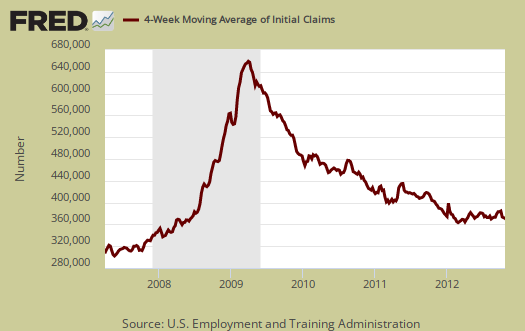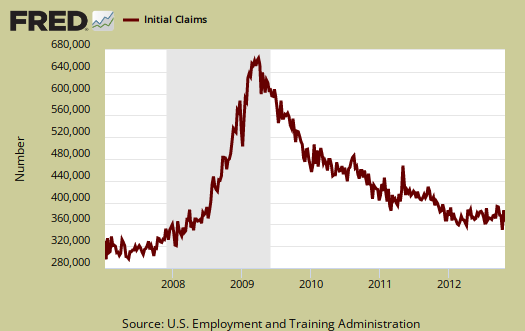The DOL reported Initial weekly unemployment claims for the week ending on October 20th, 2012 were 369,000, a 23,000 drop from the previous week of 392,000. Last week's initial claims were originally reported to be 388,000, a 4,000 upward revision.

As we pointed out in our weirdness in initial unemployment claims article, one state two weeks ago didn't report their quarterly adjustments. Now we see California had 26,935 additional claims for last week, October 13th. It is clear California was late in processing their quarterly adjustments two weeks ago, which threw off the initial claims statistics.
As much as people wish it so, most government data is not complete and not real time. We have repeatedly warned, ad nauseum, do not bank on initial claims number reported in the press release for that week. Initial claims for unemployment benefits is a weekly statistic and that implies a very short time window for data collection, it is always revised the next week, almost always upward. One can have unusual events which throw off the seasonal adjustment algorithm. One can have missed timing of events that can also throw a monkey wrench in one week's worth of data.
The statistic to pay attention to is the four week moving average on initial unenmployment claims. The four week moving average increased 1,500 to 368,000. In the below graph we can see we still are not at pre-recession initial weekly unemployment claims levels. If anyone recalls, even before the Great Recession the job market was not so hot. Below is the four week moving average, set to a log scale, from April 1st, 2007.

Below is the mathematical log of initial weekly unemployment claims. A log helps remove some statistical noise, it's kind of an averaging and gives a better sense of a pattern. As we can see, we have a step rise during the height of the recession, but then a leveling, then a very slow decline, or fat tail. That fat tail is our never ending labor market, stuck in the mud, malignant malaise.

Continuing unemployment claims didn't budge, and we have large long term unemployed. The below figure doesn't include those receiving extended and emergency unemployment benefits.
The advance seasonally adjusted insured unemployment rate was 2.5 percent for the week ending October 13, unchanged from the prior week's unrevised rate. The advance number for seasonally adjusted insured unemployment during the week ending October 13 was 3,254,000, a decrease of 2,000 from the preceding week's revised level of 3,256,000. The 4-week moving average was 3,269,750, a decrease of 6,750 from the preceding week's revised average of 3,276,500.
In the week ending October 6th, not seasonally adjusted, the official number of people obtaining some sort of unemployment insurance benefit was 4,917,460 with 2,052,957 people receiving EUC, which is scheduled to run out in January 2013. There were 12.1 million unemployed in September.
.

Recent comments